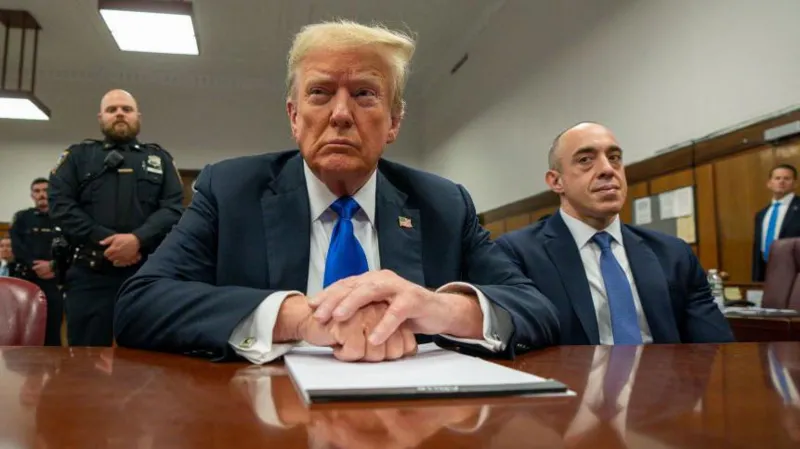
Trump’s New York sentencing still could happen even after election victory
Donald Trump’s return to the White House effectively slammed the door on the two cases involving federal criminal charges against him.
A state case against him for allegedly conspiring to interfere with Georgia’s election in 2020 will go on hold until after his term in office ends – if it’s still alive by then.
But next week, the fate of the remaining case – his conviction on 34 felony counts in New York – will be determined. It could stand, or it could be swept away in the same political and legal tide that has allowed him to escape the others.
Justice Juan Merchan will decide by Tuesday whether to grant Trump’s pre-election request to throw out his conviction. Should Justice Merchan side with Trump, it would almost wipe clean his slate of criminal woes.
But should the judge uphold the conviction, he would proceed to sentencing later this month. It would likely spark even more delay attempts from Trump and open up an unprecedented new front for America’s criminal justice system.
“This is truly uncharted territory,” said Anna Cominsky, a professor at the New York Law School.
Will Trump’s case get thrown out
In May, a New York jury found Trump guilty of falsifying business records. The convictions stemmed from Trump’s attempt to cover up reimbursements to his ex-lawyer, Michael Cohen, who in 2016 paid off an adult film star to remain silent about an alleged sexual encounter with Trump.
Trump’s lawyers argue that a recent US Supreme Court ruling granting presidents a degree of immunity from criminal prosecution applies to certain aspects of his New York case, and therefore the indictment and conviction should be tossed.
During the trial, Justice Merchan dismissed attempts by Trump’s lawyers to throw out the case on immunity grounds. But that was before the US Supreme Court ruled in Trump’s favour this summer – and before Trump decisively won re-election.
Justice Merchan has set a deadline of 12 November to decide whether to grant Trump’s request.
If he throws out the conviction, that will be the end of the case.
But if he denies the defense’s request, Trump’s much-delayed sentencing will remain scheduled for 26 November.
An unprecedented sentencing – with jail unlikely
Even if Justice Merchan upholds the conviction and keeps the scheduled sentencing, Trump’s team is almost certain to seek more delays and appeals.
Todd Blanche, Trump’s lead attorney, did not respond to inquiries about whether he planned to seek a delay.
Because Trump will be tied up with a presidential transition and the legal questions about sentencing a president are so complex, some scholars see very little chance it will stay on the calendar.
“I think the most likely outcome in the state case is the judge putting off sentencing until after Trump’s term in office,” said Daniel Charles Richman, a professor at Columbia Law School.
“To actually impose a sentence would raise any number of messy issues in the short term,” including political ones, he said.
If Trump does find himself in a Manhattan courtroom later this month, deciding his fate still would be an unprecedented challenge.
Under the law, Trump faces a range of sentences, including fines, probation and up to four years in prison. But many options are rendered impractical by his imminent return to the White House.
“Sentencing a sitting president may be one of the most complicated, fraught sentencing decisions you can imagine,” Ms Cominsky said.
“It’s hard to imagine what sentence could be imposed that would not impede a president’s ability to do their job or compromise the president’s security.”
Few expect Justice Merchan to sentence Trump to a stint behind bars at this point.
“He’s a 78-year old man with no criminal history, who has been convicted of a non-violent felony,” said retired New York Supreme Court Justice Diane Kiesel. “I don’t think a judge would give a person under those sentences an incarceration sentence.”
Even if Justice Merchan did reach for such a sentence, Trump’s team would almost certainly appeal it, delaying actual punishment.
Trump could leave a sentencing hearing with the legal equivalent of a slap on the wrist. Justice Merchan could ask the former president to pay a relatively small fine in the three- or four-figure range.
He could also give Trump an unconditional discharge; “basically, goodbye,” as Justice Kiesel puts it.
Trump has no pardon power here
The only thing that is certain is that Trump cannot make this conviction go away on his own.
Trump has explored the possibility of pardoning himself from potential criminal charges in the past, and could do so for his federal indictments when he becomes president in January.
But he cannot pardon himself in New York, as the conviction occurred in state court.
His fate, at the moment, is in the hands of the court. But regardless of the outcome, Trump will likely avoid the most serious punishments facing him.
“He is a very lucky man,” Justice Kiesel said.

